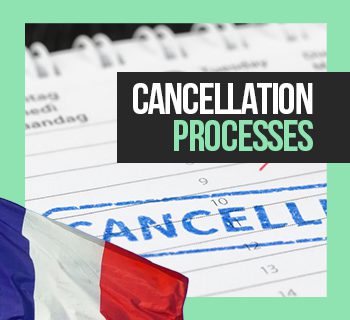Becoming the proud owner of a French property often involves a steep learning curve. Questions such as “so what is a copropriété?” and “where do you think the fosse septique is located?”, take on huge importance. So too does the myth and mystery that surrounds French insurance policies and especially the frequently asked question, “so just how do you cancel a policy?”
Coming from overseas where policy cancellation can often be done simply and almost instantly, the French approach can take a bit of getting used to. But, once you understand how insurance cancellation works in France, it is not that complicated and has actually become easier in recent years.
Cancelling property or motor insurance
When it comes to property and vehicle insurance for private individuals, the policies can be canceled at any point if you give a notice period of 31 days and the policy is over a year old. This comes under a process known as the loi Hamon and the procedure can only be triggered by the new insurance company, this ensures that customers are not left without cover. If you choose this option you will get a full refund of any premium paid upfront (with any cover period already ‘used’ deducted on a pro rata basis) and by law, no cancellation fees or penalty payments can be applied.
The policies can also be canceled at any time if the risk has ‘gone’; in other words, once you have moved out (in the case of a tenant) or sold the property or vehicle. However, in either scenario the insurance company will require proof that these events have taken place before they will cancel the policy. In the case of a rented property they will require the document known as the état des lieux de sortie from the tenant and in the case of a sale, they will ask for the acte de vente from the owner and when selling a vehicle, you will need to supply the insurers with the certificat de cession. The good news is that the premium refunds will be backdated (as long as the date on the documents is less than three months old), so even if you moved a month ago you will get that part of the premium refunded as well.
You can also cancel the traditional way, in other words, on the renewal date; however, you will need to ensure that you have sent the cancellation notification at least two months prior to the renewal date. You can also prevent the policy from being automatically renewed. In this scenario you have 20 days to cancel the policy (from the renewal date) after you've received the renewal premium from the insurance company. With both these approaches you need to be both organised and a stickler for dates! This is especially true in the second case; you will need to calculate the 20 days precisely to avoid any potential break in insurance cover or having a premium debited anyway and then attempting to recover it…
What about business insurance?
Much the same applies to business insurance. There are generally only two ways of terminating a professional insurance contract: either the insurers consider that the risk is ‘gone’ which usually means a business being wound up or sold on and with proof of this (whether sale documents, final paperwork etc), the insurance policy can be amended or canceled. Notice can also be given to the insurance company two months prior to the renewal date. Again, it’s vital to get the dates correct and ensure that you are not left without cover.
Beware of banking delays
As most insurers edit their bank debits around the middle of the month for the following month (usually around 15 to 20 days before the debits are due for payment), assuming you cancel even ten days prior to the renewal date, you are highly likely to be debited anyway and this is why this cancellation method is generally not the best choice.
How to cancel my mortgage insurance?
When it comes to mortgage insurance the law has very recently been changed and customers can now use the résiliation infra annuelle procedure to change policies whenever they want. They no longer have to wait until the first year is up. However, here again, the change in policy request can only be triggered by the new insurance company. The original provider does have the right to contest the switch but they are required to demonstrate a concrete reason (such as a substantial difference in the cover provided) for any refusal. Should the mortgage be paid off or in the case of a remortgage, you can again send proof of this to the insurers who will then cancel the policy going back to the date of the event in question.
Can we cancel top-up health insurance the same way?
Cancellation of top-up (mutuelle) health insurance is covered by an equivalent of the loi Hamon called the résiliation infra annuelle. This means that you can change providers whenever you want once the policy is over 12 months old.
If you return to your home country or move overseas or if you no longer require top-up cover for a similar reason, then the policy can be canceled once you can present the insurers with a certificat de radiation à la CPAM. This proves that you are no longer part of the French system and as such, there is nothing to be ‘topped up’ anymore. Again, you can also cancel the policy at the renewal date giving the insurance company two months notice prior to the renewal date. In situations where people become eligible for the CSS (complémentaire santé solidaire) the state will pay the insurance company directly so this is not really a cancellation as such.
Catharine's top tip:
Always send your cancellation letter, recorded delivery and request confirmation that it has been received. This is known as LRAR and stands for lettre recommandée avec avis de réception and it's a good habit to get into when sending any official letter in France and this can even be done online through services like resilier.com.


